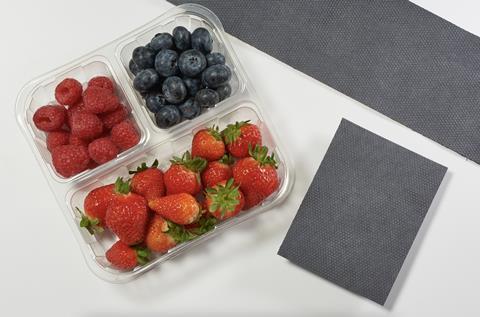Elliott Absorbent Products is launching its 100 per cent plastic-free, recyclable and compostable fruit pad, Echo
A new recyclable and compostable pad has entered the market, designed to help berry producers and their customers reduce food waste and cut carbon emissions.

Elliott Absorbent Products is launching its Echo fruit pad, that it has said extends the shelf-life of berries by up to 12 hours and can also be recycled or composted by the consumer.
According to Elliott, the Echo pads are 100 per cent plastic-free and utilise Tensei second harvest technology.
They are made from sustainable straw crop residues, including seeds, skins, and fibre crops after processing, along with perennial grasses and annual fibre crops.
Elliott highlighted that in the UK alone, over 5.3bn fruit pads end up in landfill each year, enough waste to cover almost half a million tennis courts.
“The new pads are a great opportunity for berry growers to extend shelf-life and cut food and packaging waste,” explained Matt Hankins, managing director of Elliott Absorbent Products.
“By switching to Echo and utilising crop waste, we can replace 1,280 metric tonnes of plastic or tree-sourced fibre every year.”
The pads are designed with an embossed surface to cushion the fruit and minimise spoilage, and it reduces product loss and waste ”as confirmed by three independent tests with fruit desks and growers”.
“With 100 per cent surface absorbency for fungal water droplets, the pads hold approximately 500ml distilled water per square metre with no need for perforations,” Elliott noted.
Echo is available in pads and rolls in black-blue, allowing for ease of IR recycling recognition.
The pads and rolls are cushioned and are made from pure cellulose, ensuring they are 100 per cent plastic-free, and are certified to EU standard UNI 11743:2019, supported by CPI and accepted in UK recycling systems.
The company pointed out that, as well as making use of a valuable waste product, the development of the Echo pad created a potential new source of income for farmers, not only addressing packaging waste but also food waste.
Figures from a 2018 Defra report illustrated this, it said, with 24 per cent of baled straw – or 2.87mn tonnes – being unused crop waste.
UK households discard approximately 6.4m tonnes of edible food each year, while globally, food waste accounts for at least 8 per cent of greenhouse gas emissions.
“Second Harvest technology enables us to replace traditional plastic pads used for fruit packaging with fibres from agricultural waste,” said Anabelle Filer, CEO of Tensei.
”This innovation promotes economic freedom, creates a significant reduction in environmental impact and end-of-life issues, allowing farmers to earn more, providing brands with valuable new options, and giving future generations hope for a more sustainable future.”



